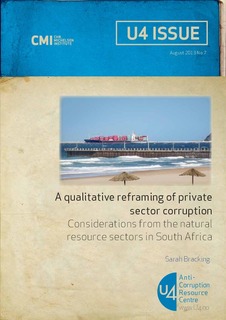| dc.contributor.author | Bracking, Sarah | |
| dc.date.accessioned | 2018-01-04T08:18:01Z | |
| dc.date.available | 2018-01-04T08:18:01Z | |
| dc.date.issued | 2013-08-02 | |
| dc.identifier | oai:www.cmi.no:4874 | |
| dc.identifier.citation | Bergen: Chr. Michelsen Institute (U4 Issue 2013:7) 36 p. | |
| dc.identifier.uri | http://hdl.handle.net/11250/2474823 | |
| dc.description.abstract | The currently used concept of private sector corruption does not cover new types of corruption that have emerged in response to the increasing complexity of the public-private boundary and the effects of more liberalized markets. Transparency initiatives are largely ineffective in cases such as South Africa, where the market and state are entwined and political connection is a critical gatekeeper for economic opportunity. The paper advocates both redefinition of the concept of corruption and reform of the process of policy design in anti-corruption work. | |
| dc.language.iso | eng | |
| dc.publisher | Chr. Michelsen Institute | |
| dc.relation | U4 Issue | |
| dc.relation | 2013:7 | |
| dc.relation.ispartof | U4 Issue | |
| dc.relation.ispartofseries | U4 Issue 2013:7 | |
| dc.relation.uri | https://www.cmi.no/publications/4874-a-qualitative-reframing-of-private-sector | |
| dc.subject | Natural Resource Management | |
| dc.subject | Corporate Corruption | |
| dc.subject | Private Sector | |
| dc.subject | South Africa | |
| dc.title | A qualitative reframing of private sector corruption: Considerations from the natural resource sectors in South Africa | |
| dc.type | Research report | |
